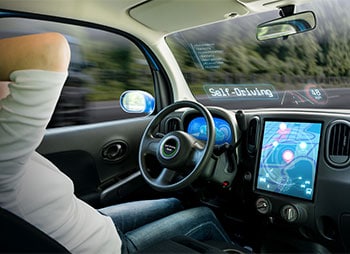
In recent years the buzz of autonomous cars has gotten louder and louder and with technology continually rising this buzz or idea is now a reality for many companies. An autonomous car, or self-driving car is a robotic vehicle that uses sensory detection, computer vision and GPS to navigate from one destination to the next with little to no human manipulation. The National Highway Traffic Administration has created a classification system that categorizes how autonomous a car is depending on how much manipulation is needed by a human.
- Level 0: The driver completely controls the vehicle at all times.
- Level 1: Individual vehicle controls are automated, such as electronic stability control or automatic braking.
- Level 2: At least two controls can be automated in unison, such as adaptive cruise control in combination with lane keeping.
- Level 3: The driver can fully cede control of all safety-critical functions in certain conditions. The car senses when conditions require the driver to retake control and provides a “sufficiently comfortable transition time” for the driver to do so.
- Level 4: The vehicle performs all safety-critical functions for the entire trip, with the driver not expected to control the vehicle at any time. As this vehicle would control all functions from start to stop, including all parking functions, it could include unoccupied cars.
Experiments on self-driving cars began in the 1920’s, and since then a multitude of companies have made great strides to develop autonomous cars. Companies at the forefront of this wave include Audi, Google and Mercedes-Benz. Four states in the US have passed laws allowing these companies to drive self-driving cars on public streets including Nevada, California, Florida and Michigan. Google claims that by the year 2020 their level 4 car will be ready to purchase. According to SmartPlanet, Self-driving cars will be an estimated $87 billion market by 2036.
With new technology on the road comes new laws. The idea that driverless cars will reduce car accidents and make careless decisions such as drunk driving extinct is progressive. However, we must look at new problems we face with self-driving cars. If an accident shall occur with a self-driving car, who will be liable? A robot cannot be liable because a robot is of course not human. Would the car owner or the car manufacturer be liable in this case? Theoretically speaking all parties involved except the victim(s) would be responsible. When these cars become popular in the near future, lawmakers will need to figure out the terms of liability for each party involved.
Self-driving cars will be our future and we must learn to adapt when the time comes. John F. Kennedy once said “Change is the law of life. And those who look only to the past or present are certain to miss the future.” Don’t miss the future.
Call For A Free Consultation
(312) 586-2820